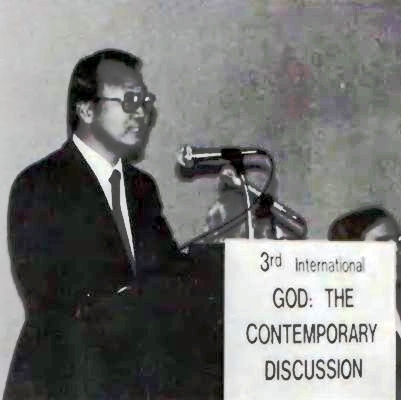![]()
The Words The Kwak Family
|
|
The Words The Kwak Family |

Distinguished Scholars, Ladies and Gentlemen:
As we conclude this third annual conference on God, I would like to thank you, on behalf of Reverend and Mrs. Sun Myung Moon, for your efforts here. I hope that you have found the discussions stimulating and fruitful, and that this conference has proven to be a valuable forum for inter- religions dialogue.
In my closing remarks at the two previous conferences, I spoke of Reverend Moon's passionate love for God, and of his life-long desire to do God's will. I spoke of his eagerness to support infra- and inter-religious discussions; and of his respect for scholars, such as yourselves, who devote their lives to overcoming ignorance, prejudice, and misunderstanding. I also spoke of his hope that these conferences will lead to future meetings, in the name of world peace, among leaders of the world's religions. Today, I would like to say more about this last point.
War and violence are nothing new, but today they are assuming eschatological proportions. International terrorism is quickly turning the entire world into a battlefield, and nuclear war threatens to destroy our entire human family. These threats to world peace constitute a challenge for our generation which is unprecedented in its magnitude and its urgency.
We can neither return to the past nor remain satisfied with the present. This unprecedented challenge demands a radical transformation, on a global scale, of our present situation.
Communism recognizes this need for radical global transformation; but it begins by denying God, proceeds by emphasizing political and economic change, and ends by justifying violent repression; so its vision for a better future is illusory. As religious people, we know that a lasting peace can never be simply a matter of political or economic arrangements. Instead, the necessary global transformation must begin with God, proceed by emphasizing harmony at all levels of human existence, especially the spiritual -- and end with world peace under God.
Therefore, inter-religious harmony is a necessary condition for world peace; but is it possible? Since God is infinite, no single religion can manifest God completely; so diversity and differences of opinion are inevitable and wholesome. But as children of the same Heavenly Parent, we are all brothers and sisters; so inter-religious conflict and divisive hatred are unnecessary. Without insisting on a monolithic uniformity, it should thus be possible to base inter- religious harmony on mutual respect and understanding. Given the urgent need for world peace, that should be the highest priority of all religious leaders.
But, realistically, how could the leaders of the world's religions begin to accomplish this awesome task? I think that this God Conference can serve as a valuable guide. You have come here from many different religious traditions, from all corners of the earth, to talk about God. Surely', no one thinks that your purpose has been to reach general agreement on matters of religious doctrine. Instead, as Professor Werblowsky so eloquently stated in his plenary address, you have come together to cultivate the "proper integrity" of "disciplined thinking." Similarly, a conference of religious leaders which did not require doctrinal unanimity, but merely mutual respect and cooperation in pursuit of common goals, could be a realistic step toward the establishment of world peace.
With this in mind, the International Religious Foundation, parent organization of, New ERA, will sponsor an International Conference of World Religions before the end of 1985. The conference will consist of perhaps 1000 to 5000 participants, including 100 to 200 delegates from each of the world's major religions, as well as representatives from other religious traditions. Its purpose will not be to legislate politically or doctrinally, but to promote mutual respect among the world's religions and to foster inter-religious cooperation on projects initiated by them. Its theme will be the renewal of spirituality and the establishment of world peace under God. Naturally, one single conference will not be sufficient; so the 1985 conference will be followed by others like it, including one in 1993, the centennial of the 1893 World Parliament of Religions held in Chicago.
This plan might seem overly ambitious, if it were not for the magnitude and urgency of our challenge. The vets' survival of our human family may depend on how quickly we can overcome our sectarian limitations. On the other hand, this plan might seem overly optimistic, were it not for the power of God and the centrality of religions in human life. Because of that power and centrality, a conference of all the world's religions could have a profound global impact.
The International Conference of World Religions will be supported financially and organizationally by the International Religious Foundation. But it also needs the support of the world's religions, many of which have been represented by you it this conference. I urge you, in the name of world peace, to join us in implementing this historic plan. We cannot retreat from our global destiny; we will either prosper together, or perish together. In this effort, we have nothing to lose but painful misunderstandings and the horrors of war. With God's help, we have harmony and peace to gain.
On behalf of Reverend and Mrs. Moon, I would like to thank you once again for coming. I hope that you have a pleasant journey home, and a happy and productive new year.
May God bless every one of you.